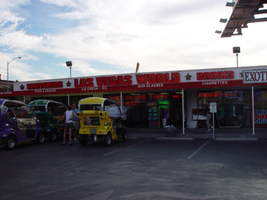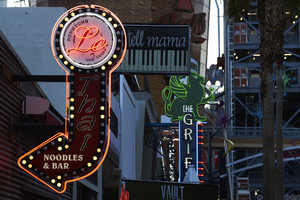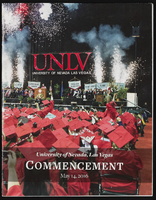Search the Special Collections and Archives Portal
Search Results
Credit Professionals of Las Vegas Records
Identifier
Abstract
The Credit Professionals of Las Vegas Records (1941-1999) include information about the organization and its two predecessors, the Credit Women's Club of Las Vegas, Nevada and the Credit Women's Breakfast Club of Las Vegas, Nevada. The collection includes scrapbooks, procedure manuals from the local and international division of the organization, awards received by the local division, and regional and local newsletters.
Archival Collection
Alan Cummings Research Files
Identifier
Abstract
The Alan Cummings Research Files (1974-2004) are comprised of research files compiled by Cummings, an elementary school teacher for the Clark County School District (CCSD) in Southern Nevada. The files represent Cummings's work to persuade the Teacher's Health Trust, the employee benefit plan for the school district, to consider domestic partnership benefits for CCSD educators and administrators. Materials include personal correspondence, newspaper clippings, magazines, and court cases.
Archival Collection
Union Plaza Photograph Collection
Identifier
Abstract
The Union Plaza Photograph Collection, approximately 1970 to 1971, consists of photographic prints and negatives taken during the construction of the Union Plaza Hotel and Casino in downtown Las Vegas, Nevada. Images portray the construction process, the surrounding area and businesses, and the completed project.
Archival Collection
Verna Mortensen Photograph Collection
Identifier
Abstract
The Verna Mortensen Photograph Collection (approximately 1960-1679) is comprised of eight photographic prints that depict Fremont Street in Las Vegas, Nevada and ferries on the Colorado River in Nevada.
Archival Collection

Transcript of interview with Susan Jones Watson by Claytee White, February 20, 2013
Date
Archival Collection
Description
A resident of Southern Nevada from the age of three, Susan Watson shares her memories of growing up and living in Las Vegas. After a year in Boulder City, Susan's father bought an old army barrack and converted it to a home in North Las Vegas; Susan remembers playing in the desert with her siblings and attending elementary and middle school before starting at Rancho High. Watching her mother design costumes for Strip performers and beautiful dresses for her own high school dances no doubt helped Susan develop her own sense of taste and style - something that she would put to good use over many years as an interior designer. Before that though, Susan shares her memories of what life was like in the Las Vegas of the 1950s and 1960s: cruising Fremont Street; movie nights; after-school work; favorite teachers; lunches on the lawn; and dance club. All combine to paint a vivid picture of a smaller town and a simpler time in the Las Vegas valley.
Text

Photographs of Las Vegas World Souvenirs signs, Las Vegas (Nev.), 2002
Date
Archival Collection
Description
Site address: 3710 S Las Vegas Blvd
Sign owner: property leased from MGM Mirage
Sign details: Located in the same lowrise building which the Las Vegas Helicopter Tours is located. See Las Vegas Helicopter Tours.
Sign condition: Structure 5 Surface 5 Lighting 5 All of the lighting, surface, and structure seem to be intact, and in good repair. The signage appears fairly new, and less worn.
Sign form: Fascia
Sign-specific description: The Las Vegas World Souvenir shop and market, boasts a collection of signage, almost completely crafted out of channel letters. The basic design is an entablature created on the wall above a pedestrian's head. The entablature runs along the south, east, and north faces of the building. The design is essentially channel letter words separated by channel designed stars. On the south wall the sequence reads, "star shape, 'drinks,' star, 'souvenirs,' star then 'market'." The interior of the star shapes are lined along the contours with yellow neon. The all caps lettering has red neon tubing on the interior. The sequence on the east side of the building reads from left to right, " star shape, 'Souvenirs,' star shape, 'Las Vegas World,' star shape, 'drinks,' then another star shape." The words "souvenir" and "drinks" are spelled in the same text and size as the south side, while the phrase "Las Vegas World" is larger fulfilling most of the height of the entablature. The north side of the building is similar to that on the south. This side reads , "Souvenirs, star shape, 'Market,' star shape, 'Film,' and another star shape." On the wall below the pediment closed face channel letters spell two phrases. The black channel letters are faced with red translucent faces. The first phrase reads , "Daily Grand Canyon Flights," in all caps. The second reads "Nightly strip rides in all capitals.
Sign - type of display: Neon; Incandescent
Sign - media: Steel; Plastic
Sign animation: Chasing
Sign manufacturer: Sign Systems, Inc
Sign - date of installation: 1996
Sign - thematic influences: There is no real present theme evident in the appearance other than the Emblem of the American flag crafted in neon on the front of the building. The incandescent bulb lined raceways and bulb filled channel letters, placed within a pediment hanging above the pedestrians head, posses a theme in a sense. It is a common occurrence to see such a combination of lighting among the strip to designate an establishment so its theme cold be considered to be that of Las Vegas. It's artistic significance can only be linked to such a trait. It is one of the most unique properties considering its function. Yes there are many facilities which offer tours but, this is the only one which provides helicopter tours that the pedestrian may watch take off. It is also one of the only establishments where the American flag is represented on the exterior in neon. It is also one of the only establishments where the incandescent bulb lined raceway is shaped into arrows. An interesting use of the most common adornment of exterior surveyed signage.
Surveyor: Joshua Cannaday
Survey - date completed: 2002
Sign keywords: Chasing; Fascia; Neon; Incandescent; Steel; Plastic
Mixed Content

Photograph of Le Thai sign, Las Vegas (Nev.), April 10, 2016
Date
Archival Collection
Description
Site address: 523 Fremont St
Sign owner: Dan and Shauna Coughlin, Dan doubles as the chef as well
Sign details: The buildings original construction year was 1934. The restaurant opened in November of 2011, Le Thai offers a famous Three curry made by Chef Dan Coughlin as well as other traditional Thai food inspired by Dans grandma and mom from Thailand. They also have a beer garden behind their main restaurant. Dan was the owner to Mix zone cafe and is the son of the owner of the King and I (Nikki Bujadham). This building has a tin facade with a pull out canopy for outdoor seating.
Sign condition: 5- looks very new and in amazing condition
Sign form: Blade
Sign-specific description: The blade is mainly made of plastic that is backlit at night time, but has a dark steel border. At the top of the sign is a circle that has Le written in black cursive on the sign, and illuminates red neon at night. Also on this circle portion of the sign it states Downtown Las Vegas in a smaller print type font. This circle is outlined in incandescents, as well as the incandescents being surrounded by red neon. Below the circle there is a red curved arrow that states Thai in black letters that have a white trim, this font looks italicized and has little circles on a part of each of the letters, this makes it a very distinct font for them specifically. Underneath the Words Thai, the sign states Noodles & Bar in a regular white block type font.
Sign - type of display: Incandescent light bulbs and neon
Sign - media: Plastic and Steel
Sign - non-neon treatments: Graphics on plastic portion of the sign are backlit
Sign animation: Chasing:
Notes: incandescent light bulbs
Sign environment: In the East side of Fremont Street, located in between Las Vegas Blvd and 6th street. To the west of the property is the Dont Tell Mama Bar and to the east is Commonwealth. Currently across the street is the Therapy restaurant and the old Emergency Arts building.
Sign manufacturer: YESCO
Sign designer: Owners Shauna and Dan
Sign - date of installation: 2012
Sign - thematic influences: The font that they use for Le and Thai are quite different but it shows the blend of how their restaurant is and does make it more distinguishable since their font draws the attention of people walking by.
Sign - artistic significance: With the usage of both Neon and incandescent the sign really does pop out which is a similar trend to many signs over the age, particularly since there is a lot of pedestrian traffic in the region. The arrow is a great direction indicator, as well as it showcases the 1950s blade sign trend with the arrow at the bottom.
Survey - research locations: Le Thai restaurant website https://lethaivegas.com/, Assessor's page, and contact with Le Thai LLC
Survey - research notes: The assessor's page said the buildings original construction year was 1934 though there was no record of what it originally opened up as.
Surveyor: Emily Fellmer
Survey - date completed: 2017-08-15
Sign keywords: Graphics; Plastic; Backlit; Steel; Blade; Chasing; Incandescent; Neon; Back to back
Mixed Content

University of Nevada, Las Vegas (UNLV) Spring 2016 commencement program
Date
Archival Collection
Description
Commencement program from University of Nevada, Las Vegas Commencement Programs and Graduation Lists (UA-00115).
Text

Daniel A. Moore interview, March 3, 1979: transcript
Date
Archival Collection
Description
On March 3, 1979, Norwood Germany Jr. interviewed Daniel A. Moore (b. 1939 in Fort Worth, Texas) about his life in Las Vegas, Nevada. Moore begins by speaking about his move to Las Vegas from Utah at a young age, his education and his work in construction and at the Las Vegas McCarran Airport. Moreover, Moore speaks about his involvement with church and his recreational hobbies such as bowling. Moore also spends time speaking about the African American population in Las Vegas, the jobs available to them, racial tensions in his young adulthood versus his children’s experiences, and the segregation of black communities into the Las Vegas Westside. Lastly, he talks about the city’s growth, tourism and the economy, the development of different shopping centers and malls, and the city’s law enforcement.
Text

Miguel Villarba oral history interview: transcript
Date
Archival Collection
Description
Oral history interview with Miguel Villarba conducted by David Islas on December 6, 2021 for Reflections: The Las Vegas Asian American and Pacific Islander Oral History Project. In this interview, Miguel Villarba shares his family's history growing up in Manila, Philippines and immigrating to the United States in 2016. He talks about first living in Chattanooga, Tennessee before moving to Las Vegas, Nevada to be near family when Miguel was in high school. Miguel Villarba shares stories of his grandfather's farm in Pangasinan, Philippines, the differences in city and town life across Manila, Chattanooga, and Las Vegas, and his educational plans. He also talks about Filipino culture and traditions, and racial discrimination.
Text
